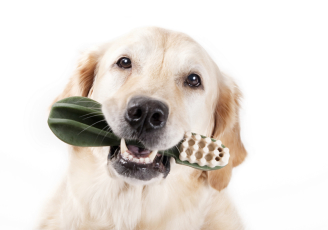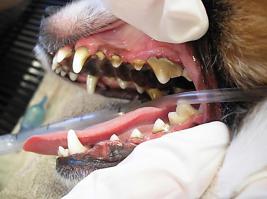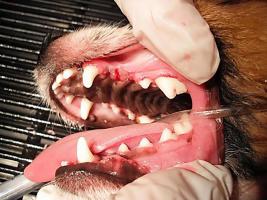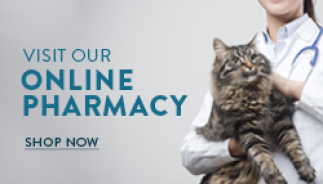Dentistry and Dental Radiography
Why is dental cleaning important?
Did you know that dogs and cats don't get cavities? They get periodontal disease instead. Periodontal disease is infection and inflammation in the tissues underneath the gum line. Because it is hidden, it is often hard to detect. More than 85% of dogs and cats over 4 years old have some form of periodontal disease. Just like in humans, neglect of your pet's teeth can result in severe dental disease and tooth loss. Most cats and dogs will continue to eat and act normal despite having painful teeth, which is why it is our job as pet owners and caretakers to monitor our pets teeth to ensure they are comfortable.
How can I tell if my pet may have dental disease?
Because many pets will try to hide pain and usually continue eating despite discomfort, it is not always easy to tell when their teeth are bothering them. Here are some warning signs you can watch for at home:
- Bad breath
- Red and inflamed gums
- Chewing on only one side of their mouth
- Loose or missing teeth
- Teeth that are discolored or covered in tartar
- Sensitivity around the mouth
- Pain or bleeding when your pet eats
This dog had significant tartar covering most of his teeth. Due to the severity of periodontal disease that invaded the root tissue, multiple tooth extractions were required.
How can I prevent periodontal disease?
Dental disease can be easily prevented. Like people, animals need regular dental cleanings and teeth brushing. There are also many veterinary approved dental diets and treats that can help remove tartar and coat the mouth with tartar-controlling enzymes.
I am concerned about anesthesia, is it really necessary?
We understand that anesthesia can seem like a scary process, and just as with humans, no anesthesia is completely risk free. This is why it is imperative for us to be able to perform an initial exam and bloodwork on your pet. This will ensure there are no underlying problems that may affect the way your pet handles anesthesia. You may be thinking "Why can't you clean my pets teeth while he is awake?" sedation-free dental cleanings can remove some of the tartar and bacteria above the gum line; but it does nothing to stop the spread of bacteria below the gum line, where periodontal disease begins. Along with awake dental cleanings not being thourough, it is also very stressful and uncomfortable for your pet. Because we cannot explain to cats and dogs why it is beneficial that they have these procedures done, it is unlikely they will cooperate long enough for adequate dental cleanings while awake. Restraining your pet and holding their mouth open would only cause unnecessary mental and physical stress.
To learn more about the risks associated with anesthia free dental cleanings, you can visit the Animal Vetreinary Dental College website. http://avdc.org/AFD/
How much does a dental cleaning cost?
The cost of each dental procedure varies for every pet. At your pets exam, if the doctor recommends your pet be seen for a denal cleaning you will be sent home with an estimate tailored to your pets oral condition and needs. The price of each dental cleaning varies depending on the amount of tooth extractions your pet needs, and the overall health of your pet's mouth. Some pets will require no extractions, which will make the cost of the dental significantly lower as well as shorten the duration of anesthesia. This is one of the reasons that we recommend your pet receives regular cleanings. When making a dental appointment, we do require a $50 deposit. This deposit will go towards your bill at time of check out. We require this due to the time set aside for this procedure. We do ask for a 48 hour notice if you are not able to make your pets dental appointment. If we do not receive a 48 hour notice that $50 deposit is non refundable. Please contact us during business hours for cancellations.
Where to Find Us:
Pierce Vet Clinic
707 N Brown St
PO box 657
Ellsworth, WI 54011
Phone: (715)-273-4632
Fax: (715)-273-7970
Email:
piercevetclinic@yahoo.com
Follow us on Facebook!
Regular Business Hours
Monday-Friday
8:00 AM to 5:00 PM
Saturday
8:00 AM to 1:00 PM
Your pet's own online profile!
Apply for your Care Credit Account today!










